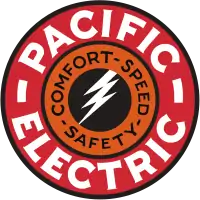Picover station
Picover was a railway station on the former Pacific Electric Owensmouth Line. Now destroyed, it was designated a Los Angeles Historic-Cultural Monument. The name is of unknown origin.
Picover | |
|---|---|
| General information | |
| Location | 16710 Sherman Way Van Nuys, California |
| Coordinates | 34°12′3.5″N 118°29′48.3″W |
| Tracks | 1 |
| History | |
| Opened | 1917 |
| Closed | 1938 |
| Designated | 1989 |
| Reference no. | 405 |
History
Originally constructed for the community of Marian (later Reseda) in 1914, the station was moved to Sherman Way between Balboa Boulevard and Hayvenhurst Avenue in 1917. Still in what was a rural farming community at the time, a new vegetable packing building was constructed adjacent to the main depot in 1932. When the Pacific Electric service in the San Fernando Valley was truncated to Van Nuys in 1938, the station was moved to its last location adjacent to Bull Creek.[1] PE received authorization to abandon the station in January 1951.[2]
By the 1980s the building had been sold and was being used as an antique mall.[3] It was made a Los Angeles Historic-Cultural Monument in January 1989.[4] The building was destroyed in a fire in June 1990.[5]
References
- Simon, Richard (December 26, 1988). "Red Car Memorial : Amid Rail Controversies, Historic Trolley Station About to Be Declared a Landmark". Los Angeles Times. Retrieved January 31, 2021.
- "W. Valley Free Bus Service Approved". Los Angeles Evening Citizen News. Los Angeles Evening Citizen News. January 11, 1951. p. 7. Retrieved February 4, 2022 – via Newspapers.com.

- Winn, Martina (November 19, 1987). "10 Antique Malls : Shopping Centers Concentrate on Heirlooms While Providing Some Old-Fashioned Fun". Los Angeles Times. Retrieved January 31, 2021.
- Simon, Richard (January 12, 1989). "Red Car Station Changed From Relic to Monument". Los Angeles Times. Retrieved January 31, 2021.
- Kazmin, Amy Louise (June 5, 1990). "Fire Destroys Valley's Last Red Car Barn : Streetcars: The small Van Nuys building, which was built in 1914, housed a collection of trolley-era memorabilia". Los Angeles Times. Retrieved January 31, 2021.
